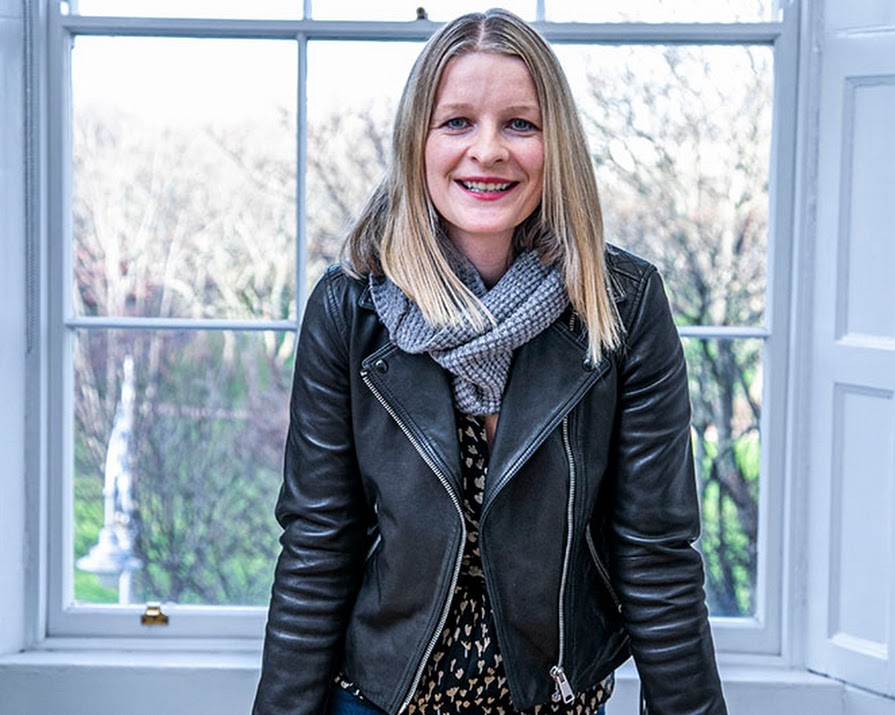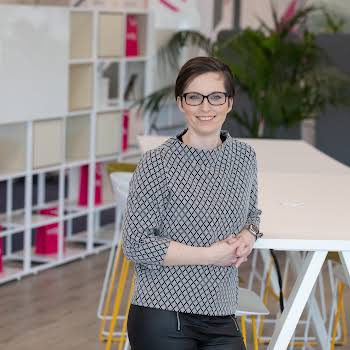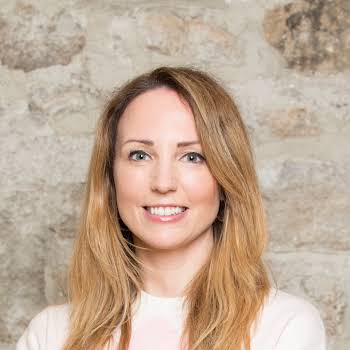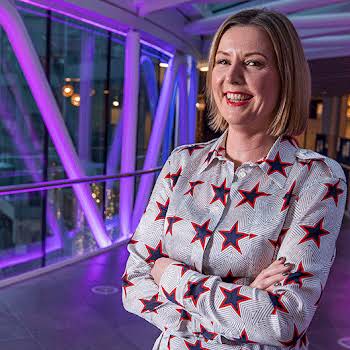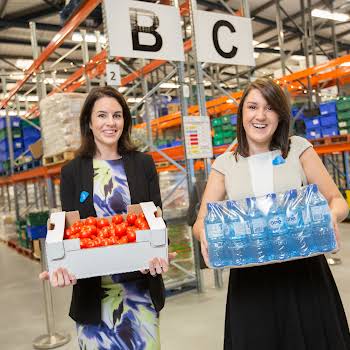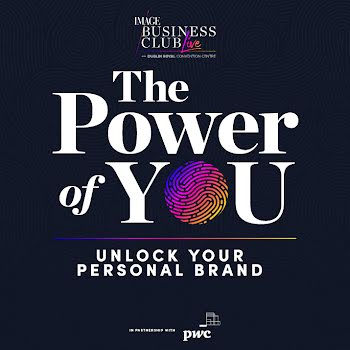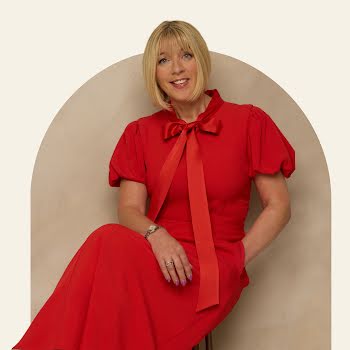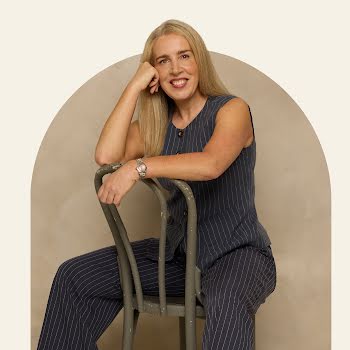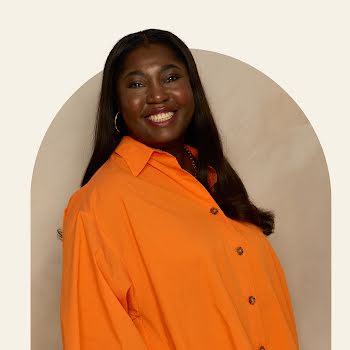Sponsored
Trailblazers in Technology: ‘I left a steady job to build a start-up in an attic while I was pregnant’ – Áine Kerr of Kinzen
Sponsored By

By Eva Hall
22nd Dec 2019
22nd Dec 2019
Sponsored By

Welcome to our Trailblazers in Technology series, in partnership with Samsung. Here we’ll profile six powerhouse women dominating not just the technology world, but their chosen area of profession. Together with Samsung, IMAGE is serious about championing female entrepreneurs, businesswomen and those who take risks everyday to reap the benefits of success. Buckle up as we introduce you to six leading professional women who are doing it not just for themselves, but for women everywhere. This week we profile Áine Kerr, co-founder and COO of Kinzen.
I had a lecturer in college who used to say “Busy people get things done.” As a 17-year-old trying to make assignment deadlines, hold down a part-time job and stay on top of a social life, this phrase used to annoy me. When I graduated and began working in busy newsrooms, I became a “busy person”, and I still felt like I got nothing done.
And that feeling was never drilled home more than when I met Áine Kerr, co-founder and COO of technology company Kinzen. When I met Áine for an early morning interview, she had just left a sick 20-month-old. Her baby, Anna, had a bug. But Áine still managed to make our interview, after fitting in an even earlier morning run, she’d told me. I had her for an hour and a half, and she was booked for another appointment straight after mine.
“Once a year I ask myself a question: Am I having the impact on the world that I want, and does this fulfil my sense of purpose?,” said Áine, when asked how she ended up on a path that she calls “accidental entrepreneur”.
It was this sense of purpose that sparked a move back to Dublin in 2018 after a three-year stint in New York, where Áine was Global Head of Journalism Partners in Facebook. Prior to Facebook, Áine had been the managing editor of Storyful, Ireland’s first social media news agency. She now heads up digital technology company Kinzen with Storyful founder and friend, Mark Little.
“I always said, in pushing myself beyond my comfort zone, that I would do a start-up again with Mark if we’d the right idea in the right moment. I always come to this thing with Mark, it’s called DVP: D is your dissatisfaction, V is your vision, and P is your process. You can evolve the process in the world, but if it doesn’t connect to the vision, you don’t have it. Equally, if you don’t understand the point of dissatisfaction, whether it’s with people or publishers, there’s no point having a visual process.
“Back in 2015, Mark and I started talking. I was at Facebook, Mark had gone off to Twitter. We’d always seen this disinformation-misinformation crisis at Storyful, and the need for trustworthy authentic journalism. Could we do what some people call the difficult second album – a second start-up?
“I could have stayed in Facebook. I could have moved to Dublin and worked for Facebook here, and continue to travel the world leading journalism partnerships. Some people are driven by legacy, for some people it’s about flexibility and having freedom to do things. For some, it’s a sense of belonging. Mine always comes down to purpose.”
Áine, from Co Monaghan, was also pregnant with her first child. “I remember at the time, my husband (Labour Party Senator Aodhán Ó Ríordáin) said, ‘Well, you could continue to be really successful in something that isn’t yours, or, you can start something that is yours and maybe fail at it. But be happy making those mistakes and having those learnings but it’s truly yours from the ground up and you will own the vision, the culture, the team, the impact it’s going to have.’ So together with my husband I decided to give up the security of a corporate job and the nice salary and perks – I would have had maternity leave and baby bonus and childcare in Facebook, but I was going to give it all up to go to the insecure world of start-up,” said Áine.
“I hate to use a cliché of do what makes you happy, but in that moment, I thought if this is truly what’s going to make me feel fulfilled, and give me that sense of purpose, then this is what I’ve got to do.”
What is Kinzen?
Kinzen is a technology company pioneering a new form of personalisation, but with a purpose. Áine and the team are building a connection between people and quality journalism using a blend of machine learning and data science, with a human layer on top.
“What we’re trying to do is move away from years of these hidden algorithms and hidden recommenders that were almost secretly tracking passive users, which has left everybody in this current era feeling very uncomfortable,” said Áine. Kinzen is working directly with publishers, like Independent News and Media’s Belfast Telegraph, to create personalised webpages and newsletters for users, where news is tailored to their likes and interests, rather than bombarding users with all of the news that unfolds in a day. Áine acknowledges this can create an echo chamber of sorts for users, who are only being exposed to their own personally curated newsfeed, so Kinzen has introduced an editor’s picks function to feed out general news in these personal webpages or newsletters.
“We believe we lost control in the decade of the social web,” she said. “We all felt we were in this endless scroll through these irritating ads, we couldn’t understand why certain things were being recommended to us. And publishers felt that too.
“If you look at Netflix and Spotify, you can see trends where we’re looking for these productive experiences, where it also feels bundled and as if we’re going to one loyal place. With your personalised newsletter, you are having an experience that recognises your profession, likes, interests, hobbies, the context of whether you are travelling on the underground, if you want audio or if you’re on a bike.
“It’s about that element of control and thinking about the personal web, it’s right content for right people in the right format in the right amount of time. It’s very much about getting people away from that endless scroll. And we’ve all been there where we’ve gone to websites, apps and platforms, and you could be there an hour and all you’ve done is scroll looking for something relevant and meaningful.”

COO of Kinzen Áine Kerr, photographed at the Kinzen offices in Dublin. Photo: Kyran O’Brien
So how does Kinzen make its money? Publishers pay a subscription which works out around €1,500 a month, and with this they get content services, where Kinzen’s techies are pulling from the publisher’s archives and making them more accessible to readers through categorisation and tagging, as well as the personalised webpages and newsletters.
Does Áine think the public’s trust issues – which mainly stemmed from Facebook and the Cambridge Analytica scandal – will affect Kinzen? Having worked at the social media giant, which has about 30,000 staff members, Áine’s answer is measured, but honest.
“Facebook and other platforms like it are still dealing with the unintended consequences of experiences that were set up with one intention. I don’t think Mark Zuckerberg ever set out in his dorm room to build the biggest destination in the world with three billion people that was also going to be the biggest distributor of news and journalism content. That wasn’t his original intent.
“But I think it’s probably fair to say that for the platforms at large, including Facebook, there probably wasn’t enough looking around corners at different milestones to see how might our platform be used by bad actors with poor intentions, and that it could be abused.
“And so I think Facebook finds itself now in this moment, it’s having to learn fast. And it’s probably a reactive place, particularly when it comes to the war on misinformation and disinformation and bad actors using its platform in that way. And then you see hate speech, intimidation, violence, trolls, etc, it’s not going to be any one solution for Facebook to really take control of that trust issue that it has with its users.
Read more: Who are The Pitch 2019 winners, Gym+Coffee?
Watch: 3 minutes with The Pitch 2018 winner Jennifer Rock
Read more: Winners from IMAGE Businesswoman of the Year 2019 Awards
“It’s going to take a very diverse, holistic approach to cleaning it up, whether it’s Facebook, Twitter, YouTube. And we have to come back to how we think about algorithms. We need a rewiring, ultimately, of those recommenders that up until now have been about surveillance of passive users. The big thing that the platforms are going to have to think about is how is that [rewiring] going to make advertisers happy? But we have to fundamentally get to this question of algorithms and recommenders, and changing those, because a lot of the research we have done in Kinzen shows that people are now very aware of the dark arts of hidden algorithms, and how cookies are tracking them across the internet, why they’re having these irritating pop-up ads.
“People feel like their own data and identity has been compromised, because, if the product is free, something’s being sold somewhere. So we are in this massive point of mistrust around that.
“I still believe in the power of technology for good and to help with social good, but there has to be that rewiring. When it comes to the war on misinformation and disinformation for Facebook, they’re doing it. I worked with a lot of really good people in New York and around the world in Facebook and here in Dublin as well. There are very well-intentioned people in places like Facebook that I have huge trust in, that are continuing to try and figure this out. It will take everything from technology and Facebook trying to build better machine learning, better data science.”
Which is exactly what the team at Kinzen are trying to achieve. Áine acknowledges the risks she’s taken in moving back home to start the Kinzen journey. Mark invested his own cash in the business, after he sold Storyful to News Corp in 2015 for a reported €18m, netting himself a reported €6m. Kinzen also has angel investors.
“You’ve seen the figures, 90% of start-ups fail. If that happened, we’d probably do what start-ups do: we’d pivot, we would make sure there is something tangible there. And we would go down another product route, we would try something different. We would be nimble, we’d be lean, we’d be agile. We would embrace there has been mistakes and learn from them.
“You always have the thought in the back of your head ‘What’s the worse that could happen if this start-up failed?’.
“For me, we could put so much journalism behind the paywall, we could be overtaken by a misinformation-disinformation paddock just so badly that democracy is at stake. That’s the one that keeps me awake at night. That is the worst that could happen in that respect, that’s the one that probably scares me most.”
She also acknowledges that the stakes are higher then ever before – she is now a mum to Anna, and is responsible for 12 people’s jobs.
“I’ve probably gotten better with age of sitting back and thinking about six weeks, six months, six years – where do I want to be? What is the impact I want to have?
“I don’t believe in this word balance, but I do believe in the idea of ruthless prioritisation every day, and that was a big learning for me in Facebook. When you move from traditional journalism – you’re always chasing – you go into Storyful for five years – a scrappy start-up that became this incredible company – then you go into Facebook – the biggest platform in the world with 30,000 people – and then back to an attic in Merrion Square with 12 people.
“I am not the 20-year-old that was running around doing politics or the 30-year-old that was in Storyful. I’m now a mother, I have other responsibilities. The stakes are higher than ever before, but I have to be smarter with my time. And that’s what I’ve gotten better at.
“I mightn’t have ever planned to get to this stage, but now I have to be a planner because there’s so much at stake in terms of people’s jobs, my own sense of happiness and purpose, my daughter, my husband’s, my wider family and friends. So ruthless prioritisation is my opposite to work-life balance.”
Ruthless prioritisation. I prefer that to “busy people get things done”…
Main photo: Kyran O’Brien
Follow the Trailblazers in Technology series, in partnership with Samsung, on social with #IMAGETrailblazers. IMAGE has long been a champion of women in business, as seen in our Businesswoman of the Year, Business Summit and Beauty of Business pillars. In Samsung, we found the perfect partner to champion women in tech. For the last two years, we’ve ran the hugely successful The Pitch competition, where a small enterprise has the opportunity to win €100,000 worth of high-tech Samsung products to propel their business to the next level. For more on The Pitch read here.











